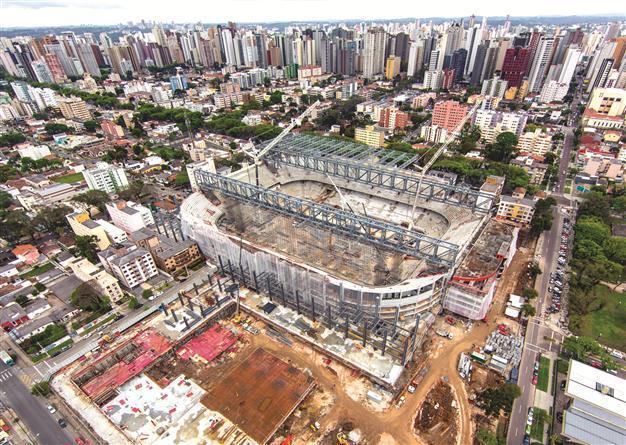World Cup on track despite stadium setback: FIFA
COSTA DO SAUIPE, Brazil - Agence France-Presse

Twelve stadiums in twelve cities will host matches, this file photo shows an aerial view of the Arena da Baixada stadium, in Curitiba, Brazil. AP photo
Global football chief Sepp Blatter insisted preparations for the 2014 World Cup in Brazil were on track Tuesday despite construction delays and a deadly accident which mean three stadiums will miss an end-of-year deadline to be ready.
As the football world geared up for tomorrow’s eagerly-anticipated draw, governing body FIFA revealed three of the tournament’s 12 venues would not be able to meet the Dec. 31 deadline for completion. One of the venues, Sao Paulo’s Itaquerao stadium, was the scene of a fatal accident last week which claimed the lives of two workers who were crushed to death when a crane toppled over.
In addition, the completion of stadiums at Curitiba and and Cuiaba is now set for February, just four months before the finals kick off in June. FIFA President Blatter however played down the significance of the construction delays, saying he was confident Brazil would be successful hosts of their first World Cup since 1950. “We have just received a report. There are some small delays in construction of stadia. But so small that with one exception (Sao Paulo) we can say everything is ready,” said Blatter.
The issues are “so small we can close our eyes,” he added.
FIFA secretary general Jerome Valcke said the stadium in Curitiba, which has been lagging behind schedule more than the other venues, would not be ready until the end of February. “We are not in crisis mood,” Valcke stressed.
“Curitiba is the one where we are facing the most problems and won’t be delivered before the end of February 2014. “We will be ready to get the stadium by the end of February 2014,” Valcke said. The Arena Amazonia in Manaus, in the heart of the tropical rain forest, also remains under construction, as does the one at Cuiaba.
Brazilian sports ministry executive secretary Luis Fernandes indicated that the stadiums lagging behind would be ready “in late January, or late February.” On Wednesday, Brazilian Sports Minister Aldo Rebelo will be among officials fronting pre-draw events where the hosts will stress they can overcome doubts about transport links, hotel prices and urban crime.
Representatives from the Ministry of Tourism and the Civil Aviation authority will also address complaints about unreasonably high prices. Other concerns focused on accommodation capacity with some 600,000 foreign tourists expected to attend the month-long event starting June 12 in Sao Paulo. There is also a shortage of domestic flight links between venues as the government mulls whether to allow foreign airlines to run domestic routes to ease the strain.
Some countries are also worried about the sheer size of the country, as some teams may face an onerous travel schedule with matches as far south as Porto Alegre, cold in the Brazilian winter, but also in tropical Manaus, and sultry Fortaleza some 3,000 kilometers away. Italy yesterday proposed the introduction of two two-minute time-outs per match to reduce the risk of players becoming dehydrated after FIFA elected not to change early afternoon kickoff times in some venues where the heat is likely to be a factor.
